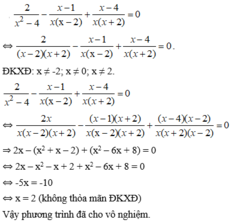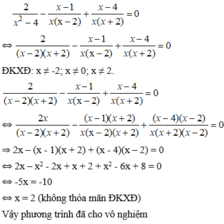giải phương trình sau: x⁴≥(x²+4x+2)²

Những câu hỏi liên quan
giải các phương trình sau : (x+2)(3-4x)=x^2+4x+4
\(\left(x+2\right)\left(3-4x\right)=x^2+4x+4\)
\(\Leftrightarrow-4x^2-5x+6=x^2+4x+4\)
\(\Leftrightarrow-5x^2-9x+2=0\)
\(\Leftrightarrow-5x^2-10x+x+2=0\)
\(\Leftrightarrow-5x\left(x+2\right)+\left(x+2\right)=0\)
\(\Leftrightarrow\left(-5x+1\right)\left(x+2\right)=0
\)
\(\Leftrightarrow\left(-5x+1\right)=0\) Hoặc \(x+2=0\)
\(\Leftrightarrow x=\frac{1}{5}\)Hoặc \(x=-2\)
Đúng 0
Bình luận (0)
(x+2)(3-4x)=x2+4x+4
<=>(x+2)(3-4x)=(x+2)2
<=>(x+2)(3-4x)-(x+2)2=0
<=>(x+2)(3-4x-x-2)=0
<=>(x+2)(1-5x)=0
<=>x+2=0 hoặc 1-5x=0
<=>x=-2 hoặc x=1/5
Đúng 0
Bình luận (0)
giải phương trình sau:
(x^2-x)^2=12+4x-4x^2
\(\Leftrightarrow y^2=12-4y\Leftrightarrow z^2=16\Rightarrow z=+-4\Rightarrow\orbr{\begin{cases}y=2\\y=-6\left(loai\right)\end{cases}}\)\(\Rightarrow\left(x-\frac{1}{2}\right)^2=\frac{9}{4}\Rightarrow\orbr{\begin{cases}x=\frac{1}{2}+\frac{3}{2}=2\\x=\frac{1}{2}-\frac{3}{2}=-1\end{cases}}\)
Đúng 0
Bình luận (0)
1) Giải các phương trình sau : a) x-3/x=2-x-3/x+3 b) 3x^2-2x-16=0 2) Giải bất phương trình sau: 4x-3/4>3x-5/3-2x-7/12
\(a,\dfrac{x-3}{x}=\dfrac{x-3}{x+3}\)\(\left(đk:x\ne0,-3\right)\)
\(\Leftrightarrow\dfrac{x-3}{x}-\dfrac{x-3}{x+3}=0\)
\(\Leftrightarrow\dfrac{\left(x-3\right)\left(x+3\right)-x\left(x-3\right)}{x\left(x+3\right)}=0\)
\(\Leftrightarrow x^2-9-x^2+3x=0\)
\(\Leftrightarrow3x-9=0\)
\(\Leftrightarrow3x=9\)
\(\Leftrightarrow x=3\left(n\right)\)
Vậy \(S=\left\{3\right\}\)
Đúng 1
Bình luận (0)
\(b,\dfrac{4x-3}{4}>\dfrac{3x-5}{3}-\dfrac{2x-7}{12}\)
\(\Leftrightarrow\dfrac{4x-3}{4}-\dfrac{3x-5}{3}+\dfrac{2x-7}{12}>0\)
\(\Leftrightarrow\dfrac{3\left(4x-3\right)-4\left(3x-5\right)+2x-7}{12}>0\)
\(\Leftrightarrow12x-9-12x+20+2x-7>0\)
\(\Leftrightarrow2x+4>0\)
\(\Leftrightarrow2x>-4\)
\(\Leftrightarrow x>-2\)
Đúng 1
Bình luận (0)
Giải bất phương trình sau : a/ 2x ^ 2 + 6x - 8 < 0 x ^ 2 + 5x + 4 >=\ 2) Giải phương trình sau : a/ sqrt(2x ^ 2 - 4x - 2) = sqrt(x ^ 2 - x - 2) c/ sqrt(2x ^ 2 - 4x + 2) = sqrt(x ^ 2 - x - 3) b/ x ^ 2 + 5x + 4 < 0 d/ 2x ^ 2 + 6x - 8 > 0 b/ sqrt(- x ^ 2 - 5x + 2) = sqrt(x ^ 2 - 2x - 3) d/ sqrt(- x ^ 2 + 6x - 4) = sqrt(x ^ 2 - 2x - 7)
2:
a: =>2x^2-4x-2=x^2-x-2
=>x^2-3x=0
=>x=0(loại) hoặc x=3
b: =>(x+1)(x+4)<0
=>-4<x<-1
d: =>x^2-2x-7=-x^2+6x-4
=>2x^2-8x-3=0
=>\(x=\dfrac{4\pm\sqrt{22}}{2}\)
Đúng 0
Bình luận (0)
Giải các phương trình sau: (x + 2)(3 – 4x) = x 2 + 4x + 4
(x + 2)(3 – 4x) = x 2 + 4x + 4
⇔ (x + 2)(3 – 4x) – x + 2 2 = 0
⇔ (x + 2)(3 – 4x) – (x + 2)(x + 2) = 0
⇔ (x + 2)[(3 – 4x) – (x + 2)] = 0
⇔ (x + 2)(3 – 4x – x – 2) = 0
⇔ (x + 2)(1 – 5x) = 0 ⇔ x + 2 = 0 hoặc 1 – 5x = 0
x + 2 = 0 ⇔ x = - 2
1 – 5x = 0 ⇔ x = 0,2
Vậy phương trình có nghiệm x = - 2 hoặc x = 0,2
Đúng 0
Bình luận (0)
Giải các phương trình sau:
2
x
2
-
4
-
x
-
1
x
(
x
-
2
)
+
x
-
4
x
(
x
+
2
)...
Đọc tiếp
Giải các phương trình sau: 2 x 2 - 4 - x - 1 x ( x - 2 ) + x - 4 x ( x + 2 ) = 0
Giải các phương trình sau:
2
x
2
-
4
-
x
-
1
x
(
x
-
2
)
+
x
-
4
x
(
x
+
2
)...
Đọc tiếp
Giải các phương trình sau: 2 x 2 - 4 - x - 1 x ( x - 2 ) + x - 4 x ( x + 2 ) = 0
Bài 1: Giải phương trình và bất phương trình sau: 1. 5.(2-3x). (x-2) = 3.( 1-3x) 2. 4x^2 + 4x + 1= 0 3. 4x^2 - 9= 0 4. 5x^2 - 10=0 5. x^2 - 3x= -2 6. |x-5| - 3= 0
giải phương trình sau:
\(\sqrt{4x^2+4x+1}=\sqrt{x^2+12x+36}\)
\(\Leftrightarrow\left|2x+1\right|=\left|x+6\right|\)
\(\Leftrightarrow\left[{}\begin{matrix}2x+1=x+6\\2x+1=-x-6\end{matrix}\right.\Leftrightarrow\left[{}\begin{matrix}x=5\\x=-\dfrac{7}{3}\end{matrix}\right.\)
Đúng 1
Bình luận (0)
ĐKXĐ: \(x\in R\)
\(\sqrt{4x^2+4x+1}=\sqrt{x^2+12x+36}\\ \Leftrightarrow\left|2x+1\right|=\left|x+6\right|\\ \Leftrightarrow\left[{}\begin{matrix}2x+1=x+6\\2x+1=-x-6\end{matrix}\right.\\ \Leftrightarrow\left[{}\begin{matrix}x=5\\x=-\dfrac{7}{3}\end{matrix}\right.\)
Đúng 1
Bình luận (0)
bài 1 : Giải các phương trình sau: a/ 4x + 20 = 0
b/ 2x – 3 = 3(x – 1) + x + 2
bài 2 : Giải các phương trình sau: a/ (3x – 2)(4x + 5) = 0
b/ 2x(x – 3) – 5(x – 3) = 0
a/ 4x + 20 = 0
⇔4x = -20
⇔x = -5
Vậy phương trình có tập nghiệm S = {-5}
b/ 2x – 3 = 3(x – 1) + x + 2
⇔ 2x-3 = 3x -3+x+2
⇔2x – 3x = -3+2+3
⇔-2x = 2
⇔x = -1
Vậy phương trình có tập nghiệm S = {-1}
Đúng 0
Bình luận (0)
câu tiếp theo
a/ (3x – 2)(4x + 5) = 0
3x – 2 = 0 hoặc 4x + 5 = 0
3x – 2 = 0 => x = 3/24x + 5 = 0 => x = – 5/4Vậy phương trình có tập nghiệm S= {-5/4,3/2}
b/ 2x(x – 3) – 5(x – 3) = 0
=> (x – 3)(2x -5) = 0
=> x – 3 = 0 hoặc 2x – 5 = 0
* x – 3 = 0 => x = 3
* 2x – 5 = 0 => x = 5/2
Vậy phương trình có tập nghiệm S = {0, 5/2}
Đúng 0
Bình luận (0)
b1
a. 4x+ 20=0 <=> 4x= -20 <=> x= -20/4 <=> x= -5
b. 2x- 3= 3(x- 1)+ x+ 2 <=> 2x- 3= 3x- 3+ x+ 2
<=> 2x- 3= 4x- 1 <=> 2x- 4x= -1+ 3 <=> -2x= 2
<=> x= 2/-2 <=> x= -1
b2
a. (3x- 2)(4x+ 5)= 0
<=>\(\orbr{\begin{cases}3x-2=0\\4x+5=0\end{cases}\Leftrightarrow\orbr{\begin{cases}3x=2\\4x=-5\end{cases}}}\)
<=>\(\orbr{\begin{cases}x=\frac{2}{3}\\x=-\frac{5}{4}\end{cases}}\)
b. 2x(x- 3)- 5(x- 3)= 0
<=> (x- 3)(2x- 5)= 0
<=> \(\orbr{\begin{cases}x-3=0\\2x-5=0\end{cases}\Leftrightarrow}\orbr{\begin{cases}x=3\\2x=5\end{cases}}\)
<=> \(\orbr{\begin{cases}x=3\\x=\frac{5}{2}\end{cases}}\)
Đúng 0
Bình luận (0)






















